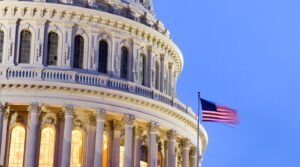You haven’t heard about it, but for over a year the U.S. Department of Education has been quietly working behind the scenes to establish national control of K-12 education curriculum. Their plans are coming close to fruition as Congress prepares to debate the renewal of the main federal education law, which the administration plans to use as a lever to force states to “voluntarily” adopt a national curriculum and even a national test that all students would have to take multiple times per year.
Historically, national control of education has come up as an issue about once every ten to fifteen years. In the past, it has usually produced a lot of fireworks but burned out pretty quickly. This year is very different. The nationalizers have learned from their past mistakes; they understand now that the American people don’t want the federal government to control schools. So they’ve adopted clever tactics to disguise what they’re doing and misdirect public attention, and as a result, they are already dangerously close to getting everything they want.
Today, a coalition of educational and other leaders, representing a broad diversity of viewpoints, is releasing a manifesto, “Closing the Door on Innovation,” that opposes this stealth campaign to impose a single curriculum and a single test on the nation’s schools. The over 100 signatories include numerous leaders in the education world, as well as such nationally known figures as Abigail and Stephan Thernstrom, Shelby Steele, Richard Epstein, and Edwin Meese. You can read it and add your signature at www.k12innovation.com. I’m proud to have played a supporting role in organizing this effort.
The Department of Education is forbidden by law from developing a national curriculum. This reflects the clear judgment of the people and their congressional representatives, expressed forcefully on all the previous occasions when this issue has come up, against handing over control of education to a single national body.
In lieu of an outright establishment of a national curriculum, the Department has spent the past year pressuring states to “voluntarily” adopt the education standards promoted by the private organization Common Core. At the same time, it has hired two consortia to develop curriculum materials and tests based on Common Core’s vision. These materials are being developed behind closed doors, with no transparency or accountability to the public.
Start your day with Public Discourse
Sign up and get our daily essays sent straight to your inbox.No one even knows exactly who’s working on the project. However, such information we do have indicates there are blatant financial conflicts of interest among some of those involved.
The Department’s existing leverage over education policy gives it a lot of muscle to make this happen. Even the president himself has openly warned states they may lose federal funding if they don’t adopt Common Core or something like it (and nothing else like it really exists). But the feds’ position has been greatly strengthened through close cooperation with the Gates Foundation. Most of the important educational organizations get funding from Gates, and Gates has made it clear that those who wish to continue lining up at its trough should take a serious look at supporting national education standards.
The combined influence of federal and Gates funding turned out to be especially great at a time when school budgets were experiencing their first contraction in living memory. Last year, many states—including Massachusetts, whose state standards were widely agreed to be the best in the nation—enacted commitments to drop their state standards for Common Core’s. Just the other day, the teachers at my daughter’s school were discussing how our state’s recent adoption of Common Core is requiring them to rework their whole curriculum.
This summer, the Department hopes to drive in the final nail by getting language into the federal education law which mandates—or that it can twist to de facto mandate—that states lose their federal funding unless they adopt a multi-state system of standards, curriculum, and testing. Only one such system exists. A single curriculum and test, designed behind closed doors by agents of the national government, in every school in the country, all done through the back door so there will be no public outcry to stop it.
There are plenty of reasons to be against a national curriculum. One is that the Common Core standards are inadequate—their “college-ready” standards are actually set below what you need to apply to most colleges. Another is that the educational special interest groups who fatten themselves by destroying children’s lives are more powerful at the national level than at the state level. Even if the standards were good now, we’d have every reason to expect that, over time, national control over education would become subordinate to interest-group agendas. More importantly, the very idea of a single, one-size-fits-all curriculum is a relic that needs to be discarded. The government’s school monopoly is moribund and desperately needs innovation. We should be encouraging more diversity of curricula and assessments, not less.
But all of those issues will get plenty of attention from others. What I’m anxious to add to the discussion is the question of what national control of education would do to our culture.
Suppose you were nostalgic for the culture wars of the 1990s. Most of us have been relieved over the past decade, as the level of cultural savagery has begun to recede, and Americans with different religious and moral viewpoints haven’t been quite as eager to viciously tear each other apart as they used to be. But suppose you missed the height of the culture wars, and wanted to find a way to bring it all back. You could hardly do better than to turn over control of K-12 education to the national government. If the 1990s were a culture war, the 2010s will be a culture Ragnarok.
Although the overt hostilities between conservative and progressive religious-moral cultures have subsided, the two groups are no closer than they were to having established common ground or a even a viable modus vivendi. The September 11th attacks and other events temporarily created space for a cultural ceasefire, but no substantial progress has been made on the underlying problem—how can we live together now that we no longer share even the most basic agreements on the morals and metaphysics that allow us to interpret the meaning of our shared laws and institutions?
Ceasefires are fragile. The shooting war can restart even if neither side really wants it to. All that has to happen is some event or development that convinces one side that the other side is going to resume hostilities—or even just that the other side is likely to do so. Neither side wants to be the second one to start shooting—that’s a great way to lose a war.
National control over curriculum creates a single lever you can pull to move every school in America. Would conservatives trust progressives, and would progressives trust conservatives, not to try to seize control of that lever to inculcate their religious and moral views among the nation’s youth? And if you don’t trust the other side not to try to seize the lever, is there any reasonable alternative to trying to seize it first?
And this would not be just a single conflict that would happen and then be over. Like the Golden Apple or the One Ring, national curriculum and testing will continuously generate fresh hostility and cultural warfare as long as they exist. And once you forge this ring, there’s no Mount Doom to drop it into.
My own view is that the root of the problem is the government monopoly on schools. Governmental monopolization of the education of children guarantees that all our religious and moral differences will be constantly politicized. School choice, in addition to delivering better academic performance, seems to me to be the only way to end the scorpions-in-a-bottle cultural dynamic and create space for shared citizenship across diverse religious and moral views.
But that’s an argument for another day. At the very least, let’s not reignite the culture wars by creating the educational equivalent of One Ring to Rule Them All. We won’t be able to heal the culture until we learn the most important lesson—real tolerance for real diversity.










